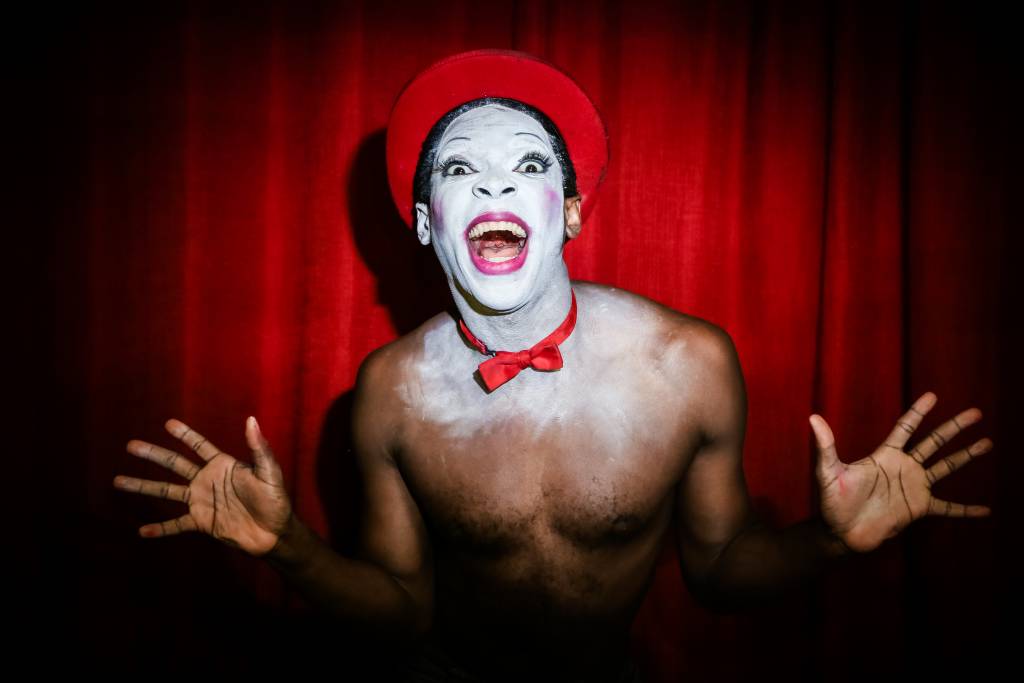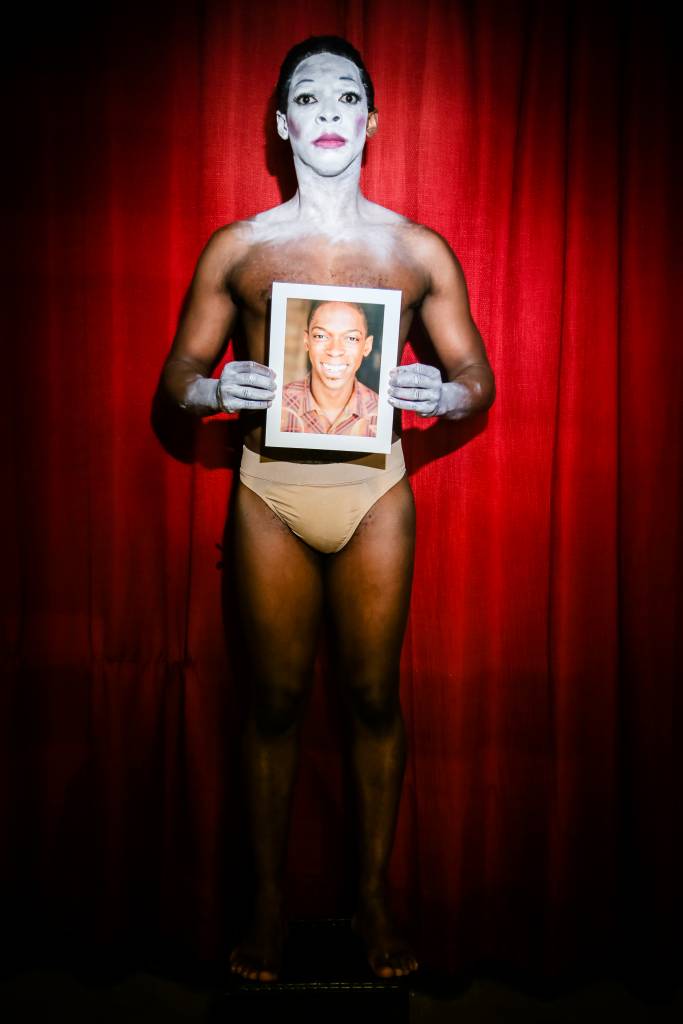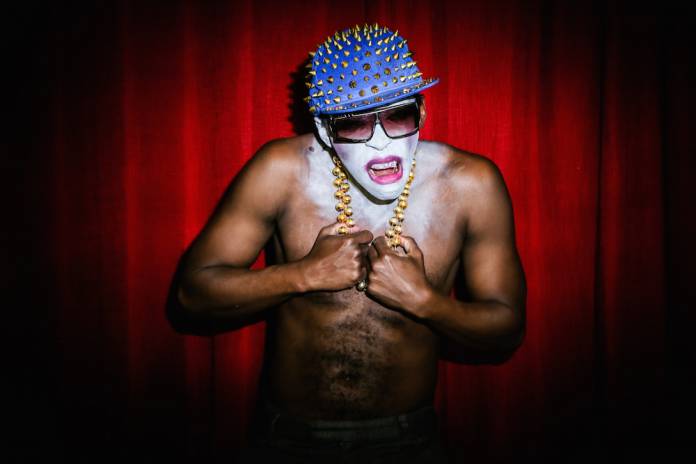ONSTAGE I’ve been close to Bay Area actor Rotimi Agbabiaka for years, during which we have spent many moments laughing. There was the time the security guard at my dad’s condo building came out at 2pm on a Wednesday tell us our guffaws were too loud for the neighbors, the scintillating visit to a laughter yoga class at UCSF (we recommend), a million outbursts and anecdotes and roasts. All his friends are well acquainted with Agbabiaka’s ringing laugh: it’s so powerful, it heals.
Laughter also serves a purpose in Agbabiaka’s weightier conversations, such as those in his self-penned offering Type/Caste: A Solo Show About Acting While Black and Queer, playing September 15 through October 1 at Brava Theater Center. In it, Agbabiaka uses humor to explain what it’s like to be a black actor in U.S. theater today — and what we as a society can win and lose from casting and programming decisions on our stages.
The script takes apart racist and homophobic casting calls culled (and only slightly exaggerated from) Agbabiaka’s real life career. Audience members will witness encounters with theater professionals who told him in all seriousness that the graduate degree holding, ‘5″7 African actor would be best cast as a “gangster.” Agbabiaka has performed in front of theaters that were filled with white faces night after night. He’s seen institutions that base their diversity programming on one single black or Asian-penned production in an entire season. Growing up, he recalls a dearth of black and queer characters who weren’t portrayed as brutish, or mentally deranged. He’s somehow able to find the laughs in all this, even an opportunity for musical theater.
Type/Caste is inspired by a series of interviews with black actors that Agbabiaka did for local publication Bay Area Theatre last year. While speaking with fellow thespians “I heard amazing stories of pitfalls and peaks,” he says in a Skype interview for 48 Hills. “But generally they were stories that echo mine, of trying to navigate a profession, an industry, an art form that hasn’t always been welcoming to people who are not white, male, heteronormative.” It was all the confirmation he needed to know that something had to change when it came to how theater institutions are approaching matters of diversity.

His partner, Shane Convery, was a sounding board for this ruminations. He suggested that there might be a larger project to be made from the interview series. Agbabiaka entered the Queer Cultural Center’s Creating Queer Community grant writing program to flesh the project out. Type/Caste won funding and debuted in a two night run at the National Queer Arts Festival this spring.
Six years ago, the Nigerian-born, freshly graduated Agbabiaka moved to the Bay Area to take his first job with the SF Mime Troupe. To this day he is closely involved with the radical theater organization, as an actor, teacher in the group’s youth theater program and truck driver when the situation arises.
He credits the troupe for teaching him that people are better able to deal with weighty social issues through laughter, a conviction that is mirrored in the jovial, music theater tone taken by Type/Caste.
San Francisco’s queer community has also shaped Agbabiaka’s perceptions of the capabilities of performance. On his first wild weekend in San Francisco, he went to The Stud for its freaky drag weekly Club Some Thing. Drag matriarch David Glamamore took the stage, in addition to performer Ambrosia Salad. “I remember very vividly that they had such a wit, a creativity, a poise to them, such a refined, daring sensibility,” Agbabiaka says. “It was so exciting.”
Help us save local journalism!
Every tax-deductible donation helps us grow to cover the issues that mean the most to our community. Become a 48 Hills Hero and support the only daily progressive news source in the Bay Area.
This was where he wanted to make his home as an actor, a place where risk taking was welcome and there was an underlying social consciousness behind art. Years later, he’s friends and collaborators with that first night’s luminaries, and has not stopped learning from their spirit of collective creativity.
“That notion has stayed with me,” Agbabiaka says. “How it’s not just about one person being a star, it’s about what you’re doing for the community, how is the community rising with you.”
No spoilers, of course, but this influence has extended into Type/Caste, which reportedly has a particularly queer moment of deus ex machina that Agbabiaka says is inspired by local institutions like Club Some Thing and monthly patio soul party Hard French.

Type/Caste, perhaps, can serve as a word of warning to those in theater who ignore their own roles in their community. When it comes to how Bay Area stage institutions can better value black and queer lives, Agbabiaka counsels increased outreach into communities that aren’t seen as traditional arts consumers (though “traditional theater audiences are a fallacy,” as he quickly reminds me.) Programming has to expand to include more diverse voices. The actor gives a brief list of playwrights whose work he would like to see better represented on Bay Area stages: Nigerian Nobel Prize winner Wole Soyinka, queer US playwright Taylor Mac, and local scribe Dave End, whose 2012 production FAGGOTS (Fabulous Artist Guys Get Overtly Traumatized Sometimes) the Musical featured the talents of Agbabiaka himself. And diversity needs to be represented at all levels of theater he says, from board members to technical staff.
In terms of his own production, Agbabiaka envisions a diverse audience — and if crowds at the debut run of Type/Caste are any metric, they will be. He recommends the play to those involved in theater, but also anyone interested in learning about how bias is created through art.
“When all you see of black people is that they’re lumbering brutes or whatever, that has a negative effect, a horrible effect on society,” he says. “It closes our minds. It validates the violence committed against people because you’ve dehumanized them and made it easier for someone to look at them and take their life, and not care if their life is being treated so horribly, like it doesn’t matter.”
Type/Caste is an attempt to decode and expose that process. But true to form, Agbabiaka is using laughter to turn us. And a running time of an hour and fifteen minutes. “You don’t have to sacrifice the humor for the message, you can still be entertaining and uplifting,” he says. “And that’s what I hope Type/Caste is, that’s what I believe that it is, and that’s what people can expect to see when they come see it.”
TYPE/CASTE: A SOLO SHOW ABOUT ACTING WHILE BLACK AND QUEER
Sept. 15-17, Sept. 19, Sept. 22-24, and Sept. 29-Oct. 1, 8pm, $18-20
Brava Theater Center
More info and tickets here.





